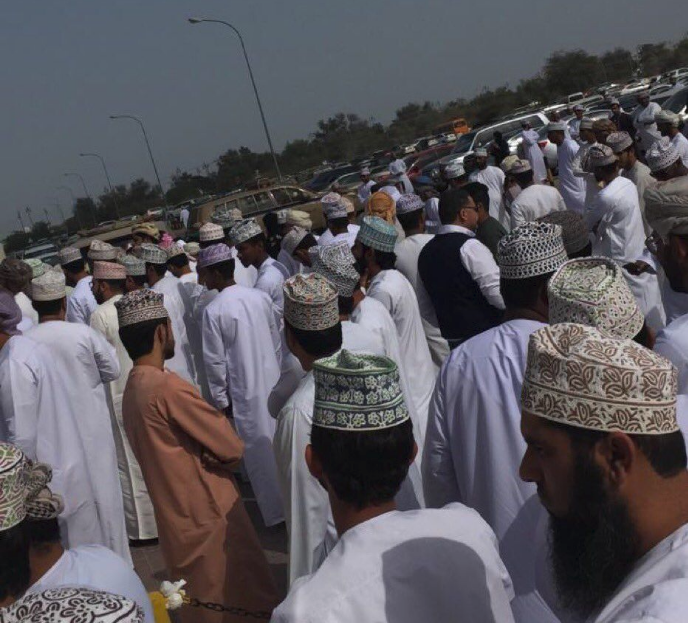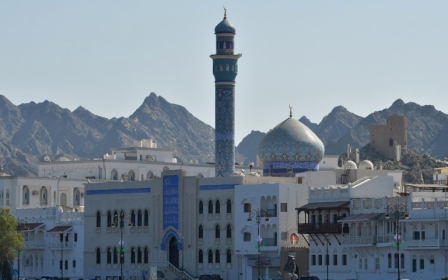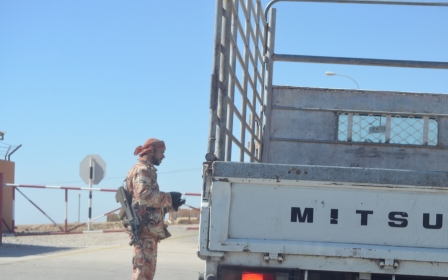Oman jobs protest spreads to other cities as arrests reported

Protests over unemployment spread from Oman's capital to provincial cities Salalah and Sur on Monday with a number of arrests reported.
Facing growing unrest over high unemployment among young Omanis, the government moved on Sunday to pledge job creation plans and to restrict employment of expat labour in a country where the vast majority of private sector jobs go to foreign workers.
The protests, which are rare in the heavily policed Gulf state, are reminiscent of those that broke out in 2011 in Oman during the Arab Spring uprisings.
A video shared by the Oman Centre for Human Rights appeared to show a number of those arrested in Salalah being transported in a police van, in the country's south.
A man on the bus said: "It's Monday 29th January, you see how we went to ask for one of our rights which is the right to work. As soon as we arrived they harassed us and took us to the bus, and straight to prison.
"Does this make sense?" he asked.
Those arrested were later reported released, the UK-based OCHR said in its Twitter post, although MEE could not confirm this.
The protests followed a government statement on Sunday reaffirming plans to increase job creation for nationals by 25,000 over the next six months.
A separate announcement by the minister of manpower, Abdullah bin Nasser al-Bakri, stated that the recruitment of expatriate labour to certain professions would be restricted for the next six months to encourage recruitment of local jobseekers, news site Atheer.om reported.
According to Ministry of Manpower data, there are more than 54,000 registered jobseekers, and unemployment in 2016 stood at 18 percent.
Oman’s Council of Ministers issued a statement, saying: “The Council of Ministers is following up, with full attention, the execution of the decision on providing 25,000 jobs for local manpower in all specialisations, so that the number could be completed within a period not exceeding six months, as a first step.
“Accordingly, the Council of Ministers is closely monitoring the progress of employment procedures on a weekly basis in order to have first-hand knowledge of what has been achieved, and deal with any challenges that might obstruct implementation.
The statement quoted Sayyid Fahd bin Mahmood al-Said, deputy prime minister, saying that "the employment of sons and daughters of this country in all fields of work is a national duty that must be advanced by all means, noting that constant attention is being accorded to this objective by the wise leadership of His Majesty Sultan Qaboos bin Said."
He added that the challenge facing Oman's economy was "the regularisation of the labour market, which the government is working hard to achieve so that the market can handle the needs of each stage of development."
The protests began in Muscat in mid-January and continued last week when scores turned up outside the Ministry of Manpower headquarters demanding jobs.
Several of the protestors were invited into the ministry to discuss their grievances with officials, a source told the WAF blog.
The vast majority of private sector jobs are taken by expats, with just 237,900 Omanis working in the sector compared to 1.87 million expats, according to government figures.
“We have been promised jobs for so long, but nothing has happened so far,” 25-year-old IT graduate Salim al-Hashar, told the UAE newspaper The National last week.
“I have been waiting for 14 months, since I graduated, and I have been rejected everywhere I have gone to apply.”
New MEE newsletter: Jerusalem Dispatch
Sign up to get the latest insights and analysis on Israel-Palestine, alongside Turkey Unpacked and other MEE newsletters
Middle East Eye delivers independent and unrivalled coverage and analysis of the Middle East, North Africa and beyond. To learn more about republishing this content and the associated fees, please fill out this form. More about MEE can be found here.




